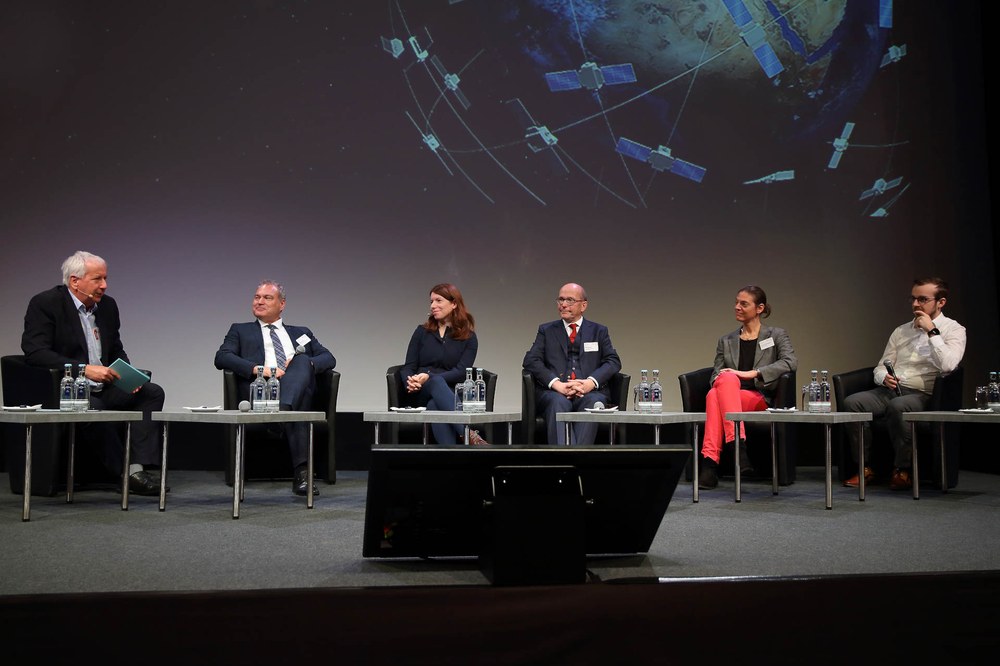The future market for small satellites



- Small satellites (satellites weighing up to 500 kilograms) are highly versatile and can be used in a variety of ways – for telecommunications services, Earth observation and climate research or testing new technologies in space.
- They can be produced in large quantities, which makes them more economical and faster to manufacture than conventional satellites and opens up a wide range of new opportunities for commercial services and science.
- Small satellites are considered to be one of the main drivers of the dynamic future market for spaceflight, especially with regard to 'New Space' – the commercialisation of spaceflight.
- Focus: Space, commercialisation, New Space, support for SMEs
The German federal government has launched the Small Satellite Initiative with the aim of consolidating the German space industry and supporting small and medium-sized enterprises (SMEs), especially start-ups, actively involved in the small satellite sector. The Bundestag allocated 10 million euros for this purpose in 2022. On 6 December 2022, representatives from industry, research and politics met in Berlin to discuss how the field of small satellites in Germany can form part of the framework of the government’s new space strategy. The conference, which was organised by the German Space Agency at DLR and the Federal Ministry for Economic Affairs and Climate Action (BMWK), also awarded prizes to the winners of the German Space Agency at DLR’s Microlauncher Payload Competition.
Germany's Small Satellite Initiative – promoting commercialisation and research
Small satellites (satellites weighing up to 500 kilograms) are highly versatile and can be used in a variety of ways – for telecommunications services, Earth observation and climate research or testing new technologies in space. They can be produced in large quantities, which makes them more economical and faster to manufacture than conventional satellites and opens up a wide range of new opportunities for commercial services and scientific research. Small satellites are considered one of the main drivers of the dynamic future space market, especially with regard to ‘New Space’ – the commercialisation of space.
"New Space applications using small satellites offer immense potential for improving life on this planet and preserving our environment," explained Anna Christmann, Member of the of the Federal Parliament and Federal Government Coordinator of German Aerospace Policy. "Due to their higher cost efficiency and lower use of resources, small satellites make it possible to acquire data from space on a larger scale and thus enable more downstream applications. Right now, it is incumbent upon us to develop the market for this technology in Germany and across Europe through our small satellite strategy. To do this, we are bringing together stakeholders from across the spectrum of research, start-ups, SMEs and industry."
The aim is to consolidate Germany’s status as a location for small satellite technology through a programme with several focal points. This includes holding competitions for the development of new small satellite platforms and low-cost ride-along options, the targeted promotion of small satellite technology at universities, SMEs and start-ups, and the improvement of technology transfer from research institutes and universities to industry. Missions that test new technologies in space will also be carried out on a regular basis. With the increasing demand for small satellites, the expansion of capacity for series production, the development of technologies to avoid collisions with fragments of space debris, and the qualification of existing electrical, electronic and electromechanical (EEE) components such as those from the automotive industry for use in space are also increasingly important.
Microlauncher Payload Competition – ride-along options for small satellites
Technological excellence and cost-efficient value creation processes are the basis for positioning oneself successfully in the dynamic and growing small satellite market. Start-ups and SMEs play an essential role here due to their agility," says Walther Pelzer, Member of the DLR Executive Board and Director General of the German Space Agency at DLR. "The reliable prospect of public contracts helps young companies in particular to secure funding. Our microlauncher and payload competitions are key elements here," adds Pelzer, referring to the role of the state as an anchor customer.
During the conference in Berlin, the 17 winners of the DLR Payload Competition were also announced. Their small satellite technologies will receive a free ride on the microlaunchers (small launch vehicles) produced by space companies Isar Aerospace Technologies GmbH and Rocket Factory Augsburg AG. Businesses, universities and research institutions from Germany and elsewhere in Europe that are looking to launch one or more small satellites for scientific or commercial missions and for testing technology in space were eligible to apply.
The Payload Competition is an integral part of the Microlauncher Competition run by the German Space Agency at DLR. The aim of this programme is to promote the commercialisation of European space activities and improve the autonomy and competitiveness of the companies and research institutions working in the sector, especially those associated with smaller payloads.
The German start-ups Isar Aerospace Technologies GmbH (Spectrum carrier rocket), Rocket Factory Augsburg AG (RFA One) and HyImpulse Technologies GmbH (SL1) made an impact at various phases of the Microlauncher Competition. The Spectrum and RFA One rockets were selected to carry out the four missions. Measuring just two metres across and 28 and 30 metres long respectively, they are designed to transport payloads weighing up to 1.5 tonnes, so they are ideal for launching small satellites.
